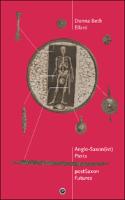Anglo-Saxon(ist) Pasts, postSaxon Futures
Author(s)
Ellard, Donna-Beth
Collection
ScholarLedLanguage
EnglishAbstract
Anglo-Saxon(ist) Pasts, postSaxon Futures traces the integral role that colonialism and racism play in the field formerly known as Anglo-Saxon studies by tracking the development of the “Anglo-Saxonist,” an overtly racialized term that describes a person whose affinities point towards white nationalism. That scholars continue to call themselves “Anglo-Saxonists,” despite urgent calls to combat racism within the field, suggests that this term is much more than just a professional appellative. It is, this book argues, a ghost in the machine of early medieval studies—a spectral figure created by a group of nineteenth-century historians, archaeologists, and philologists responsible for not only framing the interdisciplinary field of "Anglo-Saxon" studies but for also encoding ideologies of British colonialism and Anglo-American racism within the field’s methods and pedagogies.Anglo-Saxon(ist) pasts, postSaxon Futures is at once a historiography of Anglo-Saxon studies, a mourning of its Anglo-Saxonist “fathers,” and an exorcism of the colonial-racial ghosts that lurk within the field’s scholarly methods and pedagogies. Part intellectual history, part grief work, this book leverages the genres of literary criticism, auto-ethnography, and creative nonfiction in order to confront Anglo-Saxonist pasts in order to imagine speculative postSaxon futures inclusive of voices and bodies heretofore excluded from the field formerly known as Anglo-Saxon studies.
Keywords
Anglo-Saxon; Old English; Medieval studies; intellectual history; autoethnography; critical race studies; psychoanalysisDOI
10.21983/P3.0262.1.00ISBN
9781950192403, 9781950192397Publisher
punctum booksPublisher website
https://punctumbooks.com/Publication date and place
Brooklyn, NY, 2019Classification
Anglo-Saxon / Old English
European history


 Download
Download